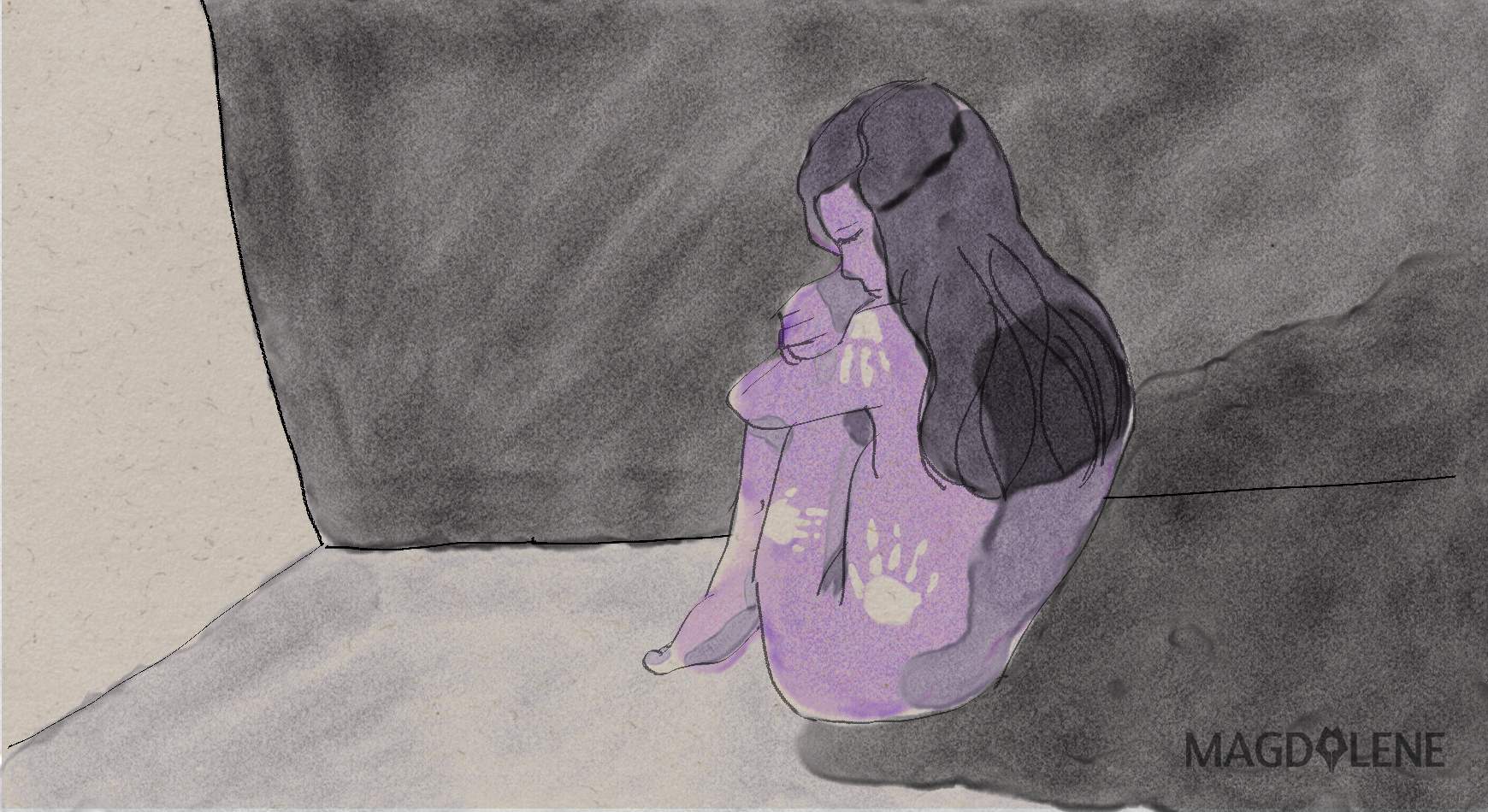When I was in college in the US, I found that people have a clear definition of what rape is. A rape is when the victim says “no” and the perpetrator continues to force a sexual encounter with her/him. So if you don’t want anything sexual to happen to you, just say “no,” and you’ve made your stance. Anything else is a rape or a sexual assault.
This concept was imprinted in my brain through every lecture about sexual harassment. Before I returned to Indonesia, I thought I was prepared. I thought I would be able to sail through the ocean of adulthood by depending on the word “NO” to reject uninvited sailors. I was wrong.
Back in Jakarta, I lived in a rented room that did not have strict rules. In the living room, sitting on deflated sofas, longhaired young dudes with heavy metal t-shirts would hang out often.
One afternoon, one of them greeted me.
“You’re new here, aren’t you?”
“Yes.”
“Just got back from work?”
“Uh-huh.”
“Do you like metal?”
“I do.”
“Can I have your phone number? I want to invite you for our band practice.”
As he said the last sentence, he suddenly stroked my cheek with the back of his hand. It made me recoil and I didn’t want to have anything to do with him again. But I wasn’t sure how to say no, so I gave him my number, went to my room and lock the door. I was hungry but I didn’t get out of the room until the next morning, after I made sure the dude and his friends were no longer there.
The same thing happened in the office. Our boss loved to flirt with pretty employees, which I thought was harmless as it was mere talk. But I began to feel uncomfortable when he drove me home from a meeting outside the office and asked if I would like to go to another place with him.
My mind raced, “Aren’t you ashamed of doing this to your own employees? How can I respect you as my boss if you stoop this low by throwing yourself at me?”
But I didn’t say anything except, “No, it’s still working hours. We should go back to the office.”
To which he replied, “Don’t worry about the office.”
A few days later, he dropped by my cubicle and gave me a bottle of perfume. “For you,” he said. And like the metal dude, he stroked my cheek before leaving.
I could only growl and threw stuff at the wall. My colleagues grinned and shook their heads, “Look, boss is acting up again.”
Another time, when I had coffee with my friends, one of them (let’s call her Nandra) told us a story.
“I met ‘A’ at a club last night. He kept buying me drinks even though I said I didn’t want to. But he dared me in front of my friends. ‘Nandra said she’s a party girl, but she won’t drink.’ So, I got very drunk. It was 2 a.m. and ‘A’ said he would drive me home. I lay down on the back seat of his car, but a few minutes later I got very confused because the car wasn’t moving. Instead, ‘A’ moved to the back seat and then…he had sex with me.”
I told her, “I don’t like her making you drunk and pretended to drive you home with the intention of sleeping with you.”
I wanted to ask Nandra if ‘A’ had sexual attacked her, but my instinct told me it was too heavy a question at that time.
Jovyna, our friend, said, “’A’ only did that kind of thing with Nandra. If she wasn’t that kind of girl, he wouldn’t have done that.”
I asked Jovyna to repeat her words, and she said, “If she wasn’t that kind of girl ….”
“What kind of girl do you think Nandra is?” I asked.
“The kind that you can have sex with. A girl like you.” Like me.
From those experiences, I feel that the word “no”, which I thought was enough to be my talisman, would not necessary work in this culture. I realized that even though I could be forward to men, I don’t have the aggressiveness to repel those I don’t like. If something happened to me and I told my friends, I’m sure they wouldn’t believe me as they would think I should’ve been brave enough to defend myself. Or they would think I deserved it because I am “a girl like Nandra.”
I feel that people’s imagination and understanding about how sexual crime happens, who the victim or the perpetrator is, and how they act are rigid and limited. It is a black and white perception that finds it impossible for a victim to still be texting with the perpetrator after her assault, when she should be running and yelling or crying and taking shower.
Many people can’t grasp how coercion doesn't only come in physical form, but through threats (of getting fired from work, of killing a family member or slander) or by breaking someone’s spirit. They have no idea that it can take a long time for a victim to acknowledge that she has been assaulted, let alone tell other people; and how it is a normal response to freeze, unable to fight, when feeling threatened – like standing still in the middle of the road instead of running for safety as we’re seeing a truck speeding towards us.
Exploring the sexual realm in Jakarta almost feels like traveling through time, meeting people from different eras: the post-modern, Middle Age, Renaissance, Dark Age, and so on. Some people prioritize purity, family honor, reputation and ego, and would do anything to keep themselves from being humiliated and shamed. Others are adventurers but don’t seem to have adequate knowledge about reproduction, venereal disease or the context of the world we live in.
A guy friend said he would never sleep with a virgin. Aside from trying to reduce his own sin, he doesn’t want to encourage others who have chosen to live with their own norms. There is also a woman friend who decided to end her relationship with a guy who came from a very traditional family. These moves seem to be ridiculous, but worthy of admiration because they take account the cultural and social context of our society, which can be cruel to people who live outside the norms.
So in the beginning of my own “adventure”, due to my lack of experience, I set my own rules to ensure that my action would not inflict losses to others and myself. Apart from implementing my knowledge about reproduction and disease, I look at the person I am with, what the consequences of our relationship are, whether he could handle it, can I respect him and vice versa, or does he take advantage of me and vice versa. Also do we both understand what each other wants. I think these considerations, more than love, give dignity to what others may see as a licentious relationship.
Of course, in reality, life is messy, and we can’t always see the situation clearly. But we can always try. Because even though we reject the norms we consider shallow or hypocritical, there is a whole entity that we cannot violate: Other people.
On the other hand, to be responsible toward ourselves, we can probably start by revealing ourselves – what we want or do not want, what we are able to face or not, and our understanding of the situation.
For me, the courage to defend ourselves and show our true colors is not something that comes naturally. It grows slowly as I read more, as I age, and as I find someone to love. My sympathy goes for others who, like me, continue to nurture and foster the courage.
Eliza Vitri Handayani is a writer, reader and translator. Her novel “Mulai Saat Ini Segalanya Akan Berubah (Everything Will Change From Now On)” was published by Obor in 2014, and is among the translated books to be displayed at Frankfurt Book Fair 2015, when Indonesia is the guest of honor. Eliza also has her short stories and essays published in Koran Tempo, Asia Literary Review, Sastra Digital, Jurnal Perempuan, In Other Words, etc. Her translation work appears in Asymptote Journal.
This article is originally written in Indonesian.








Comments